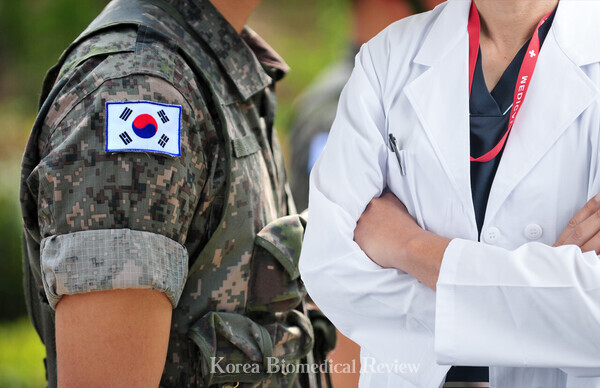The Ministry of National Defense is considering establishing a military medical school, tentatively named the National Defense Medical School, as part of efforts to strengthen public healthcare by securing long-term military doctors.

The primary reason for the ministry's push to establish its own medical school is the low application rate for military doctors.
Military doctors are divided into short-term service of three years and long-term service of ten years. Over the past decade, the number of applicants for long-term service has remained in the single digits in recent years -- four in 2014, two in 2015, three in 2016, two in 2017, one in 2018, three in 2019, none in 2020, one each in 2021 and 2022, and none in 2023.
As a result, as of July last year, out of 2,400 military doctors, only 180 (7.5 percent) were long-term doctors.
The ministry based its plan for the military doctors' academy on the fact that the U.S. and Japan train military doctors. The U.S. operates the Uniformed Services University as a federal educational institution, while Japan has its National Defense Medical College, which trains military doctors and nursing officers.
The ministry intends to proceed cautiously after thorough discussions with the medical community, relevant organizations, and the National Assembly.
During a regular briefing, ministry spokesperson Jeon Ha-kyu mentioned plans to persuade the medical community, saying, "We are reviewing various directions and collecting opinions," and added that "it seems premature to provide specific answers at this stage."
Medical community expresses anger
Despite the ministry's statements, the medical community criticized the government’s plan.
Notably, physicians stress that the establishment of the National Defense Medical Academy, which was discussed in 2011, was scrapped after concerns about an oversupply of medical personnel were raised.
If the establishment of the National Defense Medical School is confirmed, there will be a need to adjust the medical school quota as the government has already allocated an increase of 2,000 students for 32 medical schools starting in 2025.
Doctors commented that this proves that the government did not throughly plan out its medical school admission quota increase plan.
The Korea Medical Association (KMA) said the fundamental reasons why military doctors do not remain in military hospitals need to be addressed.
KMA spokesperson Chay Dong-young, in a phone interview with the Korea Biomedical Review, noted that although there is a system in place to select and educate cadets at medical schools, it has not been effectively implemented.
He criticized that establishing a National Defense Medical School would be pointless unless the treatment of military doctors improves fundamentally.
"It's not something that can be enforced through a system,” Chay said. “There needs to be institutional improvement to address the fundamental issues, but the government does not seem to show such determination."
Chay emphasized that the government should consider why military doctors do not want to stay in the military.
KMA President Lim Hyun-taek also criticized the plan, pointing out that similar systems already exist, such as sending cadets to Seoul National University and Yonsei University for training.
He mentioned that these cadets often specialize in fields like plastic surgery or dermatology, which have little to do with military healthcare.
Lim urged the government to reflect on whether the military medical system is functioning properly, noting that medications are often insufficient even at the battalion level, leading to inadequate medical treatment.
He criticized the lack of proper medical resources and allocation, making it difficult for military doctors to provide effective care.

